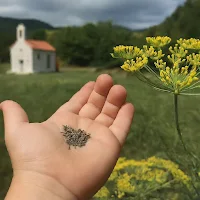Odd, Obscure, Fascinating And Frankly Fun Facts About Dill
Fun Facts You Didn't Know About Dill
Dill is a deep green herb with feathery, delicate leaves. If you've ever seen it fresh, you'll recognize it right away. Its appearance is that distinctive. Dill also has a curious flavor that, on first tasting it, makes you think maybe you don't like it - but then something amazing happens. After a moment, you realize sour actually tastes pretty good. The flavor of dill is cooling on a hot day, can distract you from the fishy taste of fish and turns a humble cucumber into a vegetable to be reckoned with.
You may be a dill lover, but you don't have to be a fan to recognize this herb has a long and interesting history. Here are some tasty tidbits about dilly, dilly dill:
Dill is related to what crunchy vegetable? If you guessed the cucumber, guess again. It's celery.
Because of its historical use as a treatment for colic, the word dill unsurprisingly derives from the old English word that means to lull or calm, dilla.
Give a bee a break. Plant dill in your landscape. Bees love it.
The interesting upside down umbrella shape of dill's flowers is actually a relatively common shape among flowering plants. It's called an umbel.
In some areas of Europe and elsewhere, lacy yellow dill flowers are common additions to flower arrangements. In a fresh bouquet, you can expect a dill flower to last for a week or so.
Before the invention of chewing gum and Tic Tacs, dill seeds were popular breath fresheners. Can you imagine taking a moment to chew on a dill seed before kissing your honey? Those were the good old days.
Ancient cultures throughout Europe used dill as protection against a variety of perceived threats. The Greeks hung dill in doorways and other portals to keep evil spirits from entering. In other areas of Europe, dill was believed to repel witches.
Today dill is still used in some spiritual and religious practices to unlock creativity, improve awareness and mental acuity, and discourage negative thoughts and influences.
Dill may have medicinal benefits. Medical research is ongoing to understand how dill might play a role in the treatment of cardiovascular disease, type 2 diabetes mellitus, Crohn's disease and more.
Dill has a long history as a treatment for colic in babies. (Please discuss using dill or any other herb medicinally with a medical professional.)
More Odd, Obscure, and Fun Facts About Dill:
What year saw the first recorded use of the phrase dill pickle? According to the Merriam-Webster dictionary, that would be 1904.Dill and fennel are related -- and not in a good way. They can cross pollinate, resulting in a plant that's tasteless if not downright unpleasant.
If you admire the fragile appearance of dill flowers, take a look at the blossom produced by its cousin, Queen Anne's lace (wild carrot). Blue lace flower is another cousin.
 |
| Queen Anne's lace |
Dill is a natural antacid. Drinking dill tea may help with digestive issues like acid stomach, bloating and flatulence.
Another popular herb, parsley, is a cousin to dill. Like parsley, dill can be used as an attractive garnish, especially when it's in flower. Give it a try.
*Dill is the plant called "anise" in the New Testament that the Pharisees chose to tithe rather than to attend to the more important matters of judgment and the love of God. - Matthew 23:23
Dill is a popular companion plant. It helps repel pests like aphids and spider mites. Companion planting is considered a sustainable gardening practice.Dill is a source of vitamins A and C and a source of iron and folate.




Comments
Post a Comment
Share some ideas.